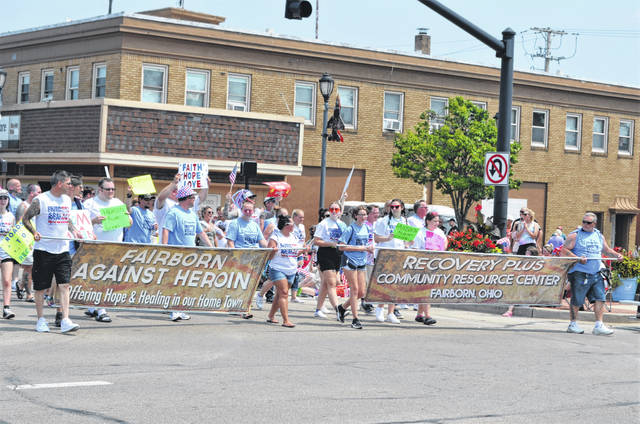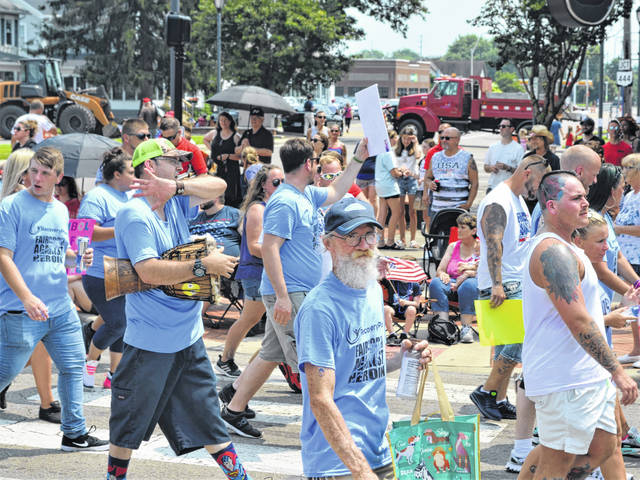

FAIRBORN — “It all started on Facebook, really,” said Fairborn Against Heroin founder Jason Kegley. “They were talking about ‘You know you’re from Fairborn if’ most of your graduating class is dead from heroin.”
Approximately 80 people marched in Fairborn’s July 4 parade this past Independence Day representing Fairborn Against Heroin, a local nonprofit dedicated to lifting addicts and their families out of the traumas of drug and alcohol addiction. Among them were recovering addicts and their families, marching with signs and bullhorns shouting “We do recover,” in what Kegley calls one of the most important parts of the organization: recovering out loud.
Fairborn Against Heroin started on Facebook in 2015. The organizations stemmed from an offshoot of the Facebook group “You know you’re from Fairbon if…”. Several founding members branched off and started Fairborn Against Heroin on Facebook, a group that now has over 4,000 people.
Fairborn Against Heroin also does business under the name RecoveryPlus, but most locals recognize their original name.
“People from here won’t buy our t-shirts unless they have ‘Fairborn Against Heroin’ on it,” Kegley joked.
Debate raged online as to what should be done about the problem. Some wanted to engage in what Kegley described as “vigilante justice,” burning the homes of drug dealers or turning them over to police. Others said to just let overdose victims die. Neither of these, he said, were good options.
“I know from experience being in long-term recovery, when one drug dealer shuts down, two more open up,” Kegley said. “We want to help people, and they won’t let us if we get them in trouble.”
According to data from Greene County Public Health, there were 49 deaths from drug overdose in 2018 in Greene County. In August, September, and October of 2019, there were 57 interactions with emergency services for expected overdoses in Fairborn alone, nearly twice that of Xenia and more than every other individual municipality in the county. 2020 overdose data was not available.
Kegley, who serves as executive director of RecoveryPlus, helped found the organization after his girlfriend at the time died of a drug overdose. A drug counselor and former user himself, Kegley had no idea she had been using.
“No one goes back to drugs saying ‘time to screw my life up,’” Kegley said. “Most of the time, it’s ‘maybe I’ll just take the edge off.’ Other people in recovery know to ask, ‘What’s really going on?’”
FAH is a non-profit, peer-run recovery organization. They offer free case management, partner with other peer-run organizations, and connect people to treatment centers. Among its other functions, FAH serves as a vital connector between addicts on the street and medical recovery centers.
“If you have someone on the street who wants help today, there may not be anywhere for them to go today. They might not want help tomorrow. The quicker we capture a person who wants help, if we can use the greater combined Ohio treatment facility picture, sometimes we can network people and say ‘hey, there’s a bed today in Portsmouth, Ohio. We can even help you find a ride there.’”
Additionally, FAH provides a space for support and companionship long after a person leaves treatment. Cookouts, dances, football Sundays, AA meetings, movie nights, rallys and other events give space for recovering addicts to come together and find activities outside of drugs or alcohol. Having events is vital for keeping people out of the environments that pushed them to use, Kegley said.
“Let’s say you have a tree,” he explained. “Something’s wrong with it, it has a disease, and wherever it’s planted everything looks like it’s dying. You take it and put it in a different spot with good soil, give it light and nutrients and nurse it back to health. You have this vibrant, growing, living thing. Then you take it and put it back in that old soil where it can’t get light. It’s surrounded by other sick things and plant it there again. It might not be getting enough light, sun, water, and you ask ‘why isn’t it growing? Why isn’t it as green as it used to be? That tree must not want to live!’”
People, he argues, are much the same.
“The truth is sometimes when you take someone out of addiction, you give them a safe, positive environment, they have structure, good role models, and they’re practicing skills they may not have had before. And once they get out, they ask ‘do I go back to the house where my whole family’s using? Do I go back on the streets?’ They may not have a house, a car, a job, or even a place to take a shower and we say ‘Go on now, stay clean!’”
After doing the work out of their living rooms for two years, the RecoveryPlus Community Resource Center was established in 2017 as a base of operations. An estimated 200 individuals pass through RecoveryPlus’ doors in a week, sometimes multiple times. The goal is to support addicts from the moment they ask for help to long after they are released from treatment, residential care, or incarceration.
“The recovery community makes this place happen,” Kegley said. “There’s oversight, but after that, it’s a clan of volunteers, some of whom are in recovery themselves.”
Recovery from drugs, regardless of how or why a person started to use, is like recovering from a chronic disease.
“You don’t graduate from addiction,” Kegley said. “Some people say it’s a lifelong process of change. One thing they all have in common is they’ve found a new way to live.”
“There’s lots of peer-run recovery centers. Our place feels a little more like home,” he added.
Kegley said that part of the importance of recovering out loud is reducing the stigma surrounding people suffering from addiction and their families. Often, a person’s addiction is minimized to avoid shame. Local law enforcement and emergency services also are a huge part of the recovery scene, and don’t get to experience a side of recovery that often goes unseen.
“Police don’t see the good stuff,” Kegley said. “They see us when we’re getting busted, or when we’re dead. I’m luckily situated where I get to see the good stuff: the graduations, people getting to see their kids again, celebrating milestones with their families.”
Currently, FAH is in the process of trying to open up recovery housing, as well as branch into legal advocacy. A myriad of political issues, both national and local, face the recovery community.
“There are millions of people in recovery. We’re not tracked as a voting demographic, but it goes beyond political lines now,” Kegley said.
Ultimately, the support of the community is what makes Fairborn Against Heroin work.
“I don’t want another person to die because of the illusion they had no choice,” Kegley said.



